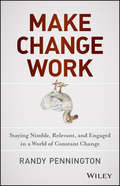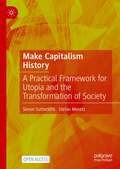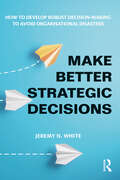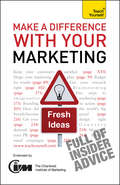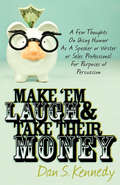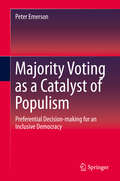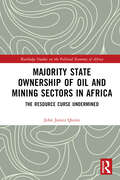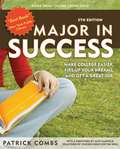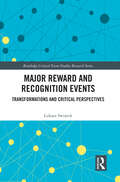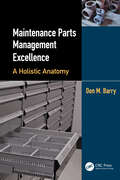- Table View
- List View
Make Change Work
by Randy PenningtonRemain competitive, inspire innovation, and ensure successConstantly adapting, improving, and changing is more important than ever for companies to remain competitive in today's marketplace. Make Change Work presents real solutions to thriving in a world of constant change. This book educates managers and leaders on how to lead change, with strategies for creating urgency, building support, and ensuring successful change. Get the guidance you need to be bold in the face of change, and learn how to make your company faster, better, cheaper, and friendlier--by simply listening to your customers Advises leaders on how to design and implement a strategy that allows you to successfully lead change and deliver meaningful business resultsAuthor Randy Pennington is a 20-year business performance veteran, author, and expert in helping organizations build a culture focused on resultsLearn how to establish a clear and purposeful goal, inspire a culture relentlessly focused on customers, and create an environment where your talented team wants to Make Change Work.
Make Change Stick: Toward Successful Large-Scale Change
by John P. Kotter Dan S. CohenKeeping change in place requires the creation of a new, supportive, and sufficiently strong organizational culture. A supportive culture provides roots for the new ways of operating. This chapter describes how to use the power of culture to help make a transformation stick.
Make Capitalism History: A Practical Framework for Utopia and the Transformation of Society
by Stefan Meretz Simon SutterlüttiThis open access book presents an alternative to capitalism and state socialism through the modelling of a post-market and post-state utopia based on an upscaling of the commons, feminist political economy and democratic and council-based planning approaches. It discusses the left’s need to explore non-capitalist modes of production, the inability of green or socialist market economies to produce real social and ecological change, and the need to look beyond traditional ideas of reform and revolution. The book discusses how a socio-economic organisation beyond money, wage labour, patriarchal division of work and centralised state planning may look like. It develops an approach to societal transformation based on seed forms of commons practices and social movements. This book will be relevant to activists, students and researchers interested in fundamental social change, political economy and feminist and Marxist economics.This is an open access book.
Make Better Strategic Decisions: How to Develop Robust Decision-making to Avoid Organisational Disasters
by Jeremy N. WhiteEvery day we hear of serious errors of judgement that result in organisational disaster. Why do seemingly successful businesses, NGOs, or even political parties fall prey to irrevocable governance breakdowns or, worse still, criminal malpractice? By prompting readers to think deeply about strategic decision-making, human behaviour, and cognitive biases, this book offers a disciplined, objective, and thoughtful approach to making better decisions. Every strategic problem is fundamentally a journey into the unknown, which involves a unique combination of duration, scale, external and internal dynamics, and personal motivations. Rarely is a strategic decision solved by saying, ‘If a situation is A, then the solution is B.’ The book explores how to develop a strong foundation for problem resolving – rather than simplistic problem-solving – by strengthening competence so that decisions are made wisely. The case of Carillion plc, the second-largest construction group in the United Kingdom that went bankrupt in January 2018, is used to explore how a large and profitable company collapsed so dramatically when it was run by an experienced board and advised by three of the Big Four accounting firms. Professor Jeremy N. White presents a clear strategic toolkit for better strategic decision-making. This book will appeal to senior managers who are interested in techniques for making better strategic decisions. The lessons from the failure of Carillion plc are applicable to corporate leaders in addition to politicians and those who run not-for-profit organisations.
Make Better Decisions More Often: 30 Minute Reads
by Nicholas BateYou're half an hour away from never making a bad decision again! Why not use your next spare half an hour to skill-up? Each of these short e-books can be read in just 30 minutes. Addressing those painful work problems, and giving practical tools and expert advice to overcome them, the 30 Minute Reads series will make your work-life more productive, less painful and more successful!Decision making not your strong suit? Fed up of thinking 'I should have chosen the other candidate/strategy/sandwich'? This succinct, practical guide will teach you how to properly weigh up all the information and make well thought out decisions more quickly.Also available in a digital bundle with 4 other titles as part of 30 Minute Reads: The business skills collection.Make Better Decisions More Often will help you:Identify the problem and what isn't workingDiscover the 10 Big StrategiesPut in place your super-structured, super-easy, 5-day count-down plan to no more pain.
Make Anything Happen: A Creative Guide to Vision Boards, Goal Setting, and Achieving the Life of Your Dreams
by Carrie LindseyEveryone wants to accomplish their goals and live the life of which they dream. But in today’s busy age, how do we make that happen? This interactive book helps readers live an intentional life by determining their priorities and tapping into their creativity to create beautiful and functional vision boards and manageable action plans to achieve their goals. Through guided worksheets, vision board templates and samples, and planning pages, author Carrie Lindsey inspires readers to get clear on what they really want and then make it happen. Getting your life in order has never been so much fun! What would happen if you set aside a little time to write down what makes you excited and what drags you down? What if you took it a step further and set specific goals for living your best life? What if that process could be creative, exciting, and lead to actual change?Use the guided worksheets to establish your priorities Create vision boards that make your goals concrete and attainable Discover strategies to manifest the life of your dreams Change is hard, but it’s worth it. And with this book, it’s also a heck of a lot of fun. Readers also have access to a private Facebook group full of members who are working towards living their dreams.
Make A REAL LIVING as a Freelance Writer
by Jenna GlatzerStep-by-step instructions on how writers can earn top dollar writing for magazines are provided in this book. Secrets are revealed about what the high-paying magazines really want, how to build relationships with editors, how to ascertain which sections of a magazine are open to freelancers, what kinds of stories are in demand, what to do if a deadbeat publisher doesn't pay up, how to market reprints, and how to become an expert in one's chosen writing field. Basic terms like query, clips, and source sheet are defined for beginning writers, and tips on everything from coming up with an idea to pitching a syndicated column are also included. Writers learn about the little-known sources top freelancers use to find new stories and experts. In addition, they learn how to get their first paying assignments even if they have no prior clips, how to negotiate for better pay, how to find high-paying magazines that aren't swamped with queries, and how to worm their way into editors' inboxes even if their e-mail addresses aren't publicized.
Make A Difference With Your Marketing: Teach Yourself (TY Business Skills)
by Jonathan GabayMake a Difference with your Marketing will help you take your marketing skills to a whole new level. By honing your imaginative skills and instilling great creative planning into your marketing, you can be sure that the results will keep you ahead of the competition. Your author, Jonathan Gabay, is one of the country's most respected creative brand consultants, and currently works with some of the world's biggest brand names. Author of no less than 13 books, and Course Director at the C.I.M. (Chartered Institute of Marketing), Jonathan's unparalleled insight and experience will provide you with all you need to target, brand, market and sell like you never have before!NOT GOT MUCH TIME?One and five-minute introductions to key principles to get you started.AUTHOR INSIGHTSLots of instant help with common problems and quick tips for success, based on the author's many years of experience.TEST YOURSELFTests in the book and online to keep track of your progress.EXTEND YOUR KNOWLEDGEExtra online articles at www.teachyourself.com to give you a richer understanding of marketing.FIVE THINGS TO REMEMBERQuick refreshers to help you remember the key facts.TRY THISInnovative exercises illustrate what you've learnt and how to use it.
Make A Difference With Your Marketing: Teach Yourself
by Jonathan GabayMake a Difference with your Marketing will help you take your marketing skills to a whole new level. By honing your imaginative skills and instilling great creative planning into your marketing, you can be sure that the results will keep you ahead of the competition. Your author, Jonathan Gabay, is one of the country's most respected creative brand consultants, and currently works with some of the world's biggest brand names. Author of no less than 13 books, and Course Director at the C.I.M. (Chartered Institute of Marketing), Jonathan's unparalleled insight and experience will provide you with all you need to target, brand, market and sell like you never have before!NOT GOT MUCH TIME?One and five-minute introductions to key principles to get you started.AUTHOR INSIGHTSLots of instant help with common problems and quick tips for success, based on the author's many years of experience.TEST YOURSELFTests in the book and online to keep track of your progress.EXTEND YOUR KNOWLEDGEExtra online articles at www.teachyourself.com to give you a richer understanding of marketing.FIVE THINGS TO REMEMBERQuick refreshers to help you remember the key facts.TRY THISInnovative exercises illustrate what you've learnt and how to use it.
Make 'Em Laugh & Take Their Money: A Few Thoughts On Using Humor As A Speaker or Writer or Sales Professional For Purposes of Persuasion
by Dan S. KennedyPeople buy more and buy more happily when in good humor. Understanding humor and being able to effectively use it for your sales and persuasion purposes is a powerful advantage--for any speaker, salesman or writer." Drawn from 30 years' experience as a popular professional speaker, author of 13 books, columnist and advertising copywriter, Dan Kennedy looks at humor as an instrument of persuasion and influence. Anyone--amateur--or pro--who must stand and deliver speeches, seminars, group sales presentations, serve as toastmaster, or write advertisements, sales letters or newsletters will find fodder here, to be faster on their feet, more confident and adept at being funny with a purpose. The book contains thoughtful insight but also simple shortcuts. Reading it, you'll get a better appreciation for the humor around you and humor professionals who entertain you, and you&’ll exit stage left with humor strategies and tricks you can use. Even if you're not all that funny. Note: this book contains adult material and may not be suitable for minors. Or for the easily offended. From the author. . ."I first titled this book "Mugging for Fun and Profit," but then thought better of it. Reminds me of Napoleon Hill being threatened by his publisher with the title 'Use Your Noodle To Get The Boodle,' which Hill transformed to 'Think And Grow Rich.' Overnight. The power of a deadline and desperation. And one of the all-time bestselling books on the subject of success the result. Anyway, unless you are just doing to hit 'em over the head and drag them out into the desert to empty their pockets, I&’d suggest, you need to know how to make 'em laugh.
Majorization and the Lorenz Order with Applications in Applied Mathematics and Economics (Statistics For Social And Behavioral Sciences Ser.)
by Barry C. Arnold Jose Maria SarabiaThis book was written to serve as a graduate-level textbook for special topics classes in mathematics, statistics, and economics, to introduce these topics to other researchers, and for use in short courses. It is an introduction to the theory of majorization and related notions, and contains detailed material on economic applications of majorization and the Lorenz order, investigating the theoretical aspects of these two interrelated orderings. Revising and expanding on an earlier monograph, Majorization and the Lorenz Order: A Brief Introduction, the authors provide a straightforward development and explanation of majorization concepts, addressing historical development of the topics, and providing up-to-date coverage of families of Lorenz curves. The exposition of multivariate Lorenz orderings sets it apart from existing treatments of these topics.Mathematicians, theoretical statisticians, economists, and other social scientists who already recognize the utility of the Lorenz order in income inequality contexts and arenas will find the book useful for its sound development of relevant concepts rigorously linked to both the majorization literature and the even more extensive body of research on economic applications. Barry C. Arnold, PhD, is Distinguished Professor in the Statistics Department at the University of California, Riverside. He is a Fellow of the American Statistical Society, the American Association for the Advancement of Science, and the Institute of Mathematical Statistics, and is an elected member of the International Statistical Institute. He is the author of more than two hundred publications and eight books.José María Sarabia, PhD, is Statistics Professor in the Department of Economics at the University of Cantabria, Spain. He is author of more than one hundred publications and ten books and is an associate editor of several journals, including Journal of Banking and Finance, TEST, and Journal of Statistical Distributions and Applications.
Majority Voting as a Catalyst of Populism: Preferential Decision-making for an Inclusive Democracy
by Peter EmersonThis timely book presents a critique of binary majority rule and provides insights into why, in many instances, the outcome of a two-option ballot does not accurately reflect the will of the people. Based on the author's first-hand experience, majority-voting is argued to be a catalyst of populism and its divisive outcomes have prompted countless disputes throughout Europe and Asia. In like manner, simple majority rule is seen as a cause of conflict in war zones, and of dysfunction in so-called stable democracies. In order to safeguard democracy, an all-party power-sharing approach is proposed, which would make populism less attractive to voters and governments alike. In geographically arranged chapters, well-tested alternative voting procedures (e. g. non-majoritarian Modified Borda Count) are presented in case studies of Northern Ireland, Central Europe, the Balkans, the Caucasus, Russia, China, North Korea and Mongolia.
Majority State Ownership of Oil and Mining Sectors in Africa: The Resource Curse Undermined (Routledge Studies on the Political Economy of Africa)
by John James QuinnMajority State Ownership of Oil and Mining Sectors in Africa: The Resource Curse Undermined shows that countries in sub-Saharan Africa with majority state ownership of their major oil or mineral export sectors suffered from more severe versions of the natural resource curse than other similar countries. Examining natural resource exporting nations in sub-Saharan Africa between 1966 to 2000, Quinn shows that on average, states with majority state ownership of these sectors featured lower growth, lower incomes, declining alternative export sectors, more debt, lower levels of investment, lower levels of political and civil rights, and more domestic conflict than other similar countries. These results remained fairly consistent across both cross-country data, as well as in paired case studies. One surprise finding is that these countries either had depreciating currencies, or did not feature high levels of currency appreciation, on average, which is inconsistent with resource curse literature predictions. Rather, most countries with majority state ownership had high levels of currency overvaluation – which operated in a similar manner as currency appreciation. This work should appeal to students and faculty interested in the political economy of development, the natural resource curse, and African development, as well as politicians, policy makers, and NGO workers working in these areas. The strong recommendation of the book is that governments should control 50% or less of these sectors.
Major in Success: Make College Easier, Fire Up Your Dreams, and Get a Great Job! (5th edition)
by Patrick CombsFor students, Combs describes how to have a successful life and career and increase quality of life by following one's enjoyment. He provides a plan that suggests going to college, finding a passion, and acquiring knowledge and experience to qualify for a dream job. He uses examples of famous people like Tom Hanks and Oprah Winfrey to show how success can happen, as well as others who succeeded in their careers. Combs is an inspirational speaker, comedic theater performer, and success coach.
Major and Serious Crime Investigations (The Professional Policing Curriculum in Practice)
by Richard Carr Colin DaviesThis text explores the concept of major and serious crime investigations as it takes the reader through the fundamental elements of investigative theory and practice that are relevant to this area of criminality.Unlike other texts that concentrate on either bespoke areas of criminality such as homicide, terrorism or tends in concepts such as county lines, this book recognises that the reader will be new to investigative study with little practitioner experience to anchor their learning. By using the latest evidence-based policing knowledge and critical thinking, it explores the concepts of major and serious crime, detailing key areas of legislation and how investigative strategies and decision making can influence successful outcomes. Other topics examined in this text is the key areas of risk for major and serious crime investigations, the impact on investigators, the concept of disclosure, investigative interviewing and how civil orders, designed to tackle this type of criminality can provide a successful alternative to prosecution.Both students and practitioners can find this book useful with this book's contemporary approach of using case studies and contemporary investigative examples relevant to the topic. This book brings together academic theory and operational understanding of major and serious crime that provides learners with an easy to follow guide that they can keep returning to throughout their career.
Major Reward and Recognition Events: Transformations and Critical Perspectives (Routledge Critical Event Studies Research Series.)
by Lukasz SwiatekUsing a range of interdisciplinary ideas, Major Reward and Recognition Events: Transformations and Critical Perspectives is an expert-led, informative volume exploring the global growth of major award shows and prize-giving ceremonies since the start of the twentieth century and outlining their key multimodal components, core functions and transformations over time. Given the growth of these events, and therefore the increase in complex resources and specialist workers required to assemble and promote them, this book discusses concerns relating to such events, including those pertaining to social justice and representation, environmental impacts, wellbeing, commercialisation, and materialistic excess. Embellished with illustrative tables and images throughout, the book covers a plethora of award shows and ceremonies, evaluating their collective future in an increasingly politically unstable, post-Covid-19 world dealing with growing global environmental change. This significant book is an invaluable resource for academics and researchers of critical event studies, communication, and media studies, as well as related social science disciplines. The book will also be of interest to enthusiasts and organisers of major recognition and reward events.
Major League Sports and the Property Tax: Costs and Implications of a Stealth Tax Expenditure (Sports Economics, Management and Policy #22)
by Geoffrey PropheterThis book updates the public policy dialogue on major league sports facilities and the property tax in the US. By providing a rigorous treatment of the property tax within the context of major league sports facilities, this volume debunks the widely asserted claim that most major league teams do not pay property taxes. The chapters methodically lay out the property tax status of every activity major league facility, the actual worth of that property tax expenditure, and the impact of property tax exemptions on local public services. Using empirical data, the volume provides a foundation for informed policy making regarding major league sports facilities. As such, this book will be a useful tool for researchers and students in sports economics, sports management, public policy, and public finance, as well as practitioners involved in the policy process.Economists have extensively studied the billions of dollars that state and local governments have devoted to funding professional sports stadiums. However, the implicit subsidies that stadiums typically receive through property tax exemptions has received scant attention. In Major League Sports and the Property Tax, Geoffrey Propheter thoroughly examines the common practice of removing sports venues from local tax rolls, which results in millions of dollars in forgone tax revenue that is often not reported in the public accounting of costs. Propheter provides a detailed examination of how property taxes are administered and the implications that derive from stadium property tax exemptions and abatements. His comprehensive analysis presents stylized facts and specific examples that provide the most thorough treatment on the subject to date. The breadth of analysis and meticulous coverage of relevant issues demonstrates why Propheter has emerged as a leading expert on the economics of stadiums. This is perhaps the most important book on the public financing of stadiums written in the past decade, and anyone interested in stadium economics will want their own copy to read and reference. JC Bradbury, Professor of Economics, Kennesaw State University
Major League Baseball Advanced Media: America's Pastime Goes Digital
by Anita Elberse Brett LaffelIn January 2010, Bob Bowman, chief executive officer of Major League Baseball Advanced Media -- MLB's digital arm -- is facing a number of decisions related to its app for Apple's new iPad. For example, what are the best name, price, and set of features for MLBAM's iPad app? The case describes what is often seen as one of the most successful paid-content businesses in sports and media. Provides in-depth information on MLBAM's four main sources of revenues and relates those to the league's overall revenues. It also describes the company's online and mobile offerings in considerable detail and outlines the choices facing MLB's offering for Apple's iPad device, enabling a rich discussion of viable marketing strategies.
Major League Baseball Advanced Media: America's Pastime Goes Digital
by Anita Elberse Brett LaffelIn January 2010, Bob Bowman, chief executive officer of Major League Baseball Advanced Media -- MLB's digital arm -- is facing a number of decisions related to its app for Apple's new iPad. For example, what are the best name, price, and set of features for MLBAM's iPad app? The case describes what is often seen as one of the most successful paid-content businesses in sports and media. Provides in-depth information on MLBAM's four main sources of revenues and relates those to the league's overall revenues. It also describes the company's online and mobile offerings in considerable detail and outlines the choices facing MLB's offering for Apple's iPad device, enabling a rich discussion of viable marketing strategies.
Major Home Appliance Industry in 1984
by John R. Wells Nasswan DossabhoyAnalyzes the major home appliance industry in the U.S. in 1984 and gives a profile of the key competitors. May be used with Major Home Appliance Industry in 1988 and Maytag in 1984.
Majid Al Futtaim Retail Geographic Expansion: Brick or Click?
by Juan Alcacer Alpana ThaparThis case illustrates the challenges that retailers face when they aggressively pursue geographical growth by expanding both their physical store network and their online presence. It features Majid Al Futtaim (MAF) Retail, a franchisee of Carrefour hypermarkets in the Middle East, Africa, and Asia, a company that strived to strike the right balance of offline and online for each of the markets it served. MAF Retail had a strong presence in the Middle East, particularly in its home market, the United Arab Emirates, and it had been building its presence in Egypt, Pakistan, Kenya, Georgia, and most recently in Uganda. There were also opportunities to open hundreds more stores in each of these markets and expand into 15 other countries in Asia and Africa where it had a license. But the retail environment was changing across the globe, owing to a shift in consumer behaviors that accompanied the rise of the online-only players. CEO Hani Weiss had been driving a digital transformation within the company, building the necessary technology and online capabilities to provide a seamless experience to its customers. The company also partnered with online-only players to increase its reach to customers in countries where MAF Retail had a presence and to provide an online offer to customers where it had no online store. Going forward, Weiss faced hard choices in deciding which markets to prioritize. He also had to determine the right balance of offline and online for each market. Should he invest his resources in opening new stores, or in building online capabilities-or both? How would his strategy differ in the key markets?
Maize In The Third World
by Christopher DowswellMaize is the world's most widely grown cereal and a dietary staple throughout the Third World, but its full potential has only begun to be tapped. This book thoroughly examines the biological and economic issues relevant to improving the productivity of maize in developing countries. The authors explore a wide range of practical problems, from maxi
Maison Bouygues
by John A. Quelch Greg ConleyThe vice president of marketing is reviewing the 1991 marketing plan and budget for Maison Bouygues, the leading builder of new single family homes in France. Due to recession, the company's sales are forecast to be flat and adjustments may need to be made in the marketing and selling mix.
Mais de 100 Dicas para Melhorar sua Vida Profissional - Ética Profissional
by Richard G Lowe Jr Vanisse Vaz FernandesDecole sua carreira sem sacrificar sua ética e integridade E se você pudesse ser bem sucedido em sua carreira? Imagine que com alguns passos simples você poderia realmente começar a desfrutar do seu trabalho, voltar para casa renovado e aumentar o seu salário? E se você pudesse fazer tudo isso sem ser um bajulador do chefe ou sacrificar sua integridade e vida pessoal? Líder corporativo e gerente por mais de 30 anos, Richard Lowe, apresenta algumas das lições que ele aprendeu gerenciando centenas de pessoas e liderando equipes felizes e realizadas. Lowe responde à pergunta: Como você pode melhorar seu trabalho, melhorar sua carreira, ganhar mais dinheiro, e ainda assim levar uma vida feliz fora do trabalho? Neste livro, você aprenderá: Como obter o respeito de seus companheiros de equipe O que é preciso para ser visto como um líder eficaz Como lidar com as “maçãs podres” no local de trabalho Por que as reuniões são desnecessárias a menos que sejam cuidadosamente gerenciadas O que fazer sobre os e-mails black-hole e o tempo perdido Por que os gestores amam prazos e como controlá-los Por que sua integridade é a mercadoria mais importante que você possui Como separar o trabalho e a vida pessoal, e manter os dois, mesmo se o chefe quiser que você trabalhe até a morte Ouça agora para aumentar sua produtividade, melhorar sua carreira e ganhar mais dinheiro!
Maintenance Parts Management Excellence: A Holistic Anatomy
by Don M. BarryMost successful organizations recognize Maintenance Parts and Procurement as a critical success factor to Asset Management Excellence and their fundamental supply chain value proposition. This book works as a guide to all the stakeholders that influence the success of their Maintenance Parts Operation and their enterprise’s bottom line. Maintenance Parts Management Excellence: A Holistic Anatomy defines the Maintenance Parts Managements role in Asset Management Excellence and expands on the importance of the Parts Inventory Planner role in an organization. It discusses how to create a unique Maintenance Parts Management Strategy for an organization and offers insights on the multiple strategies needed to create and maintain a Maintenance Parts inventory policy. The book also provides an organized overall approach to creating Maintenance Parts Management Excellence in an enterprise. Executives with an organization responsible for the construction, management, and disposal of all assets classes (plant, equipment, IT assets), consultants responsible for assignments associated with optimizing life cycle decisions for clients, maintenance, and reliability professionals within an organization, will benefit from this professional plus book. Upper-level undergraduate engineering students, as well as graduate students of management who focus on operations management and engineering graduate students addressing issues of maintenance and reliability engineering, may also be interested in this book.
